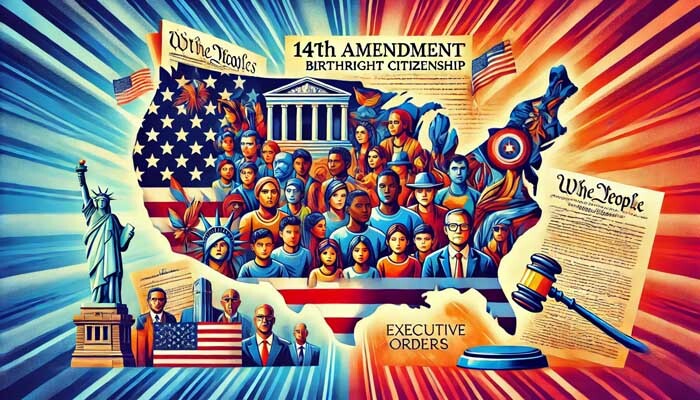DLnews Immigration:
The cradle of American citizenship may soon find itself rocked by a political earthquake. President-elect Donald Trump has reignited his long-standing campaign to end birthright citizenship, a bedrock of U.S. identity rooted in the 14th Amendment. This fiery promise has sparked fierce debate, spotlighting immigration, constitutional law, and the economic future of America’s border areas like Coachella Valley.
At the heart of the controversy lies the 14th Amendment, a post-Civil War promise declaring that “all persons born or naturalized in the United States, and subject to the jurisdiction thereof, are citizens of the United States.” It’s a simple but sweeping guarantee, forged in the fires of a fractured nation, that has made the U.S. a beacon for millions seeking a fresh start. Yet, Trump and his allies argue the system is rife with abuse, accusing undocumented immigrants and “birth tourists” of exploiting this constitutional right.
Trump’s Push to Rewrite the Rules
Trump claims birthright citizenship is “ridiculous” and incentivizes illegal immigration. His proposed executive order would require at least one parent to be a U.S. citizen or lawful resident for their child to gain automatic citizenship. Such a move would withhold Social Security numbers, passports, and welfare benefits from children of undocumented parents.
Critics argue this approach would plunge millions into legal limbo, creating a stateless underclass. According to the Migration Policy Institute, 5.5 million U.S.-citizen children live with at least one undocumented parent. Stripping these children of citizenship would ripple through industries reliant on immigrant labor, such as agriculture in Southern California while raising costs for local governments managing a surge in disenfranchised residents.
Border Towns and the Economic Fallout
Take Southern California’s Coachella Valley, a lush agricultural hub powered by immigrant workers. Without the protections of birthright citizenship, families might avoid settling or working in the area, leaving industries starved for labor. Local economies could lose billions in productivity, while a diminished workforce and tax base could damage the national GDP by a multi-billion-dollar amount. The notion of upward mobility, long tied to citizenship, could become a mirage for many.
A Constitutional Clash for the Ages
The legal roadblock is monumental. Trump’s critics point to the 14th Amendment’s crystal-clear language and the 1898 Supreme Court case United States v. Wong Kim Ark, which affirmed that children born on U.S. soil are citizens, even if their parents are not. Trump’s proposed executive order would almost certainly face court challenges, with legal scholars calling it an audacious gamble destined for a constitutional showdown.
Proponents of birthright citizenship argue it prevents a fractured society. “One of America’s greatest strengths is that anyone born here belongs here,” said Alex Nowrasteh of the Cato Institute. “It keeps us from creating a permanent underclass.” Meanwhile, critics like NumbersUSA say it incentivizes unauthorized immigration, straining resources and undermining the immigration system.
America at a Crossroads
Trump’s push to redefine citizenship goes far beyond immigration. It’s a question of what it means to be an American and whether the Constitution’s promises are ironclad or malleable. For border communities, the stakes are painfully immediate; for the nation, the implications are generational. Whether this latest chapter in America’s immigration saga ends with an executive order, a Supreme Court ruling, or a constitutional amendment remains to be seen. But one thing is sure: the debate over birthright citizenship is far from over, and the nation is watching.

![]() \
\
Share this page with your family and friends.